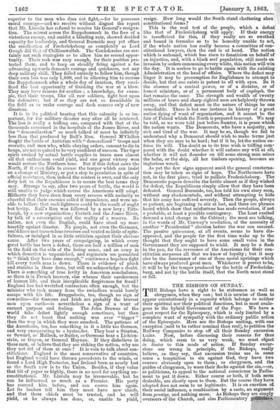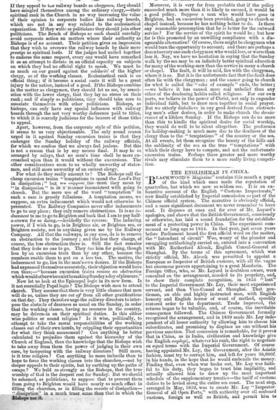THE BISHOPS ON SUNDAY. T HE Bishops have a right to
be statesmen as well as clergymen, when they can ; but it is unwise of them to appear ostentatiously in a capacity which belongs to neither their spiritual nor their political functions, but is most analo- gous to the hybrid Government of the Pope. We have a great respect for the Episcopacy, which is only limited by a complete want of sympathy with the ordinary public action of the Episcopate. Here are the Bishops uniting, with one exception (said to be rather nominal than real), to petition the Railway Companies to stop off all their Sunday excursion t..-ains. Now, before discussing their reasons for thus doing, which seem to us very weak, we must object in limas to this mode of action. If Sunday excur- sions are wrong in principle, if the Bishops, really believe, as they say, that excursion trains are in some sense a temptation to sin against God, they have two courses obviously open to them ; as clergymen, and the guides of clergymen, to warn their flocks against the sin,—or, as politicians, to appeal to the national conscience in Parlia- ment to put it down. Either course or both, if both seem desirable, are clearly open to them. But the course they have adopted does not seem to us legitimate. It is an exertion o£ their social influence, a combination by a caste, an argument from prestige, and nothing more. As Bishops they are simply overseers of the Church, and also Parliamentary politictaes. If they appeal to tae railway boards as clergymen, they should have mingled themselves among the ordinary clergy,—their spiritual rank in the Church in no way increasing the value of their opinion to corporate bodies like railway boards, which are not in any way related to the ecclesiastical organization. If they write as politicians they should join other politicians. The Bench of Bishops as such should carefully avoid corporate action on matters where their authority as Bishops is of no account. Their petition gives an impression that they wish to overawe the railway boards by their mere prestige as spiritual lords. If the judges had united together to endorse the same request, every one would have remarked it as an attempt to dictate in an official capacity on subjects on which they had no official right to speak. We must be as much on our guard against the solidariti of the higher clergy, as of the working classes. Ecclesiastical rank is an official thing; if it become a social caste it will be a great injury to the nation, instead of a good. If the Bishops combine in the matter as clergymen, they should let us see, by associ- ation with the lower clergy, that they lay no stress on their rank; and if simply as politicians, they should take care to associate themselves with other politicians. Bishops, as bishops, can only have any special influence with railway boards through the not very worthy deference paid to titles, to which it is scarcely judicious for the bearers of those titles to appeal.
Apart, however, from the corporate style of this petition, it seems to us very objectionable. The only sound reason urged in it against Sunday excursion trains is that they endanger the Sunday holiday of the railway officials, for which we confess that we always feel jealous. But this is not a reason that is by any means final. It may be so arranged by relays, that no man's time shall be more en- -croached upon than it would without the excursions. The other considerations seem to us wholly unworthy of states- men, and still more unworthy of an earnest clergy. For what do they really amount to ? The Bishops call the cheap excursion trains "temptations to spend the Lord's Day in dissipation ; " but Ivo unrPose_the t they mean by -" in dissipation" is in --a—irianner inconsistent with going to church. But the mere use of the word " temptation " in such a case is grossly fallacious. A. temptation means, we suppose, an extra inducement which would not otherwise be presented. The Railway Companies never offer inducements to go to any place; they only remove obstructions. It is no in- -duceraent to me to go to Brighton and back that I am to pay half- a-crown for so doing,—decidedly the reverse. The inducing power, if I wish to go, is in Brighton air, or Brighton sea, or -Brighton society, not in anything given me by the Railway Company. All that the railways, in any case, do is to remove an obstruction to the journey ; and the less they charge, of course, the less obstruction there is. Still the fact remains that they bribe no one to go. They tax him for going, though less by an excursion train than by any other, because the numbers enable them to put on a less tax. The motive, the inducement to go, lies in the man's own desires. If the Bishops had expressed themselves accurately, their objection would have run thus;—"because excursion trains remove an obstruction which wouklotherwise exist to makin g Sunday a day ofpleasure."
Now let us look at the Episcopal logic in its new form. Is it not essentially Papal logic ? The Bishops wish men to attend church. They assume that there is very little chance that men will do so, unless they are cut of from all other gratifications on that day. They therefore urge the railway directors to inter- pose the obstacle of dearness as usual on the Sunday, in order that the working classes, having no resource in the country, may be driven-in on their spiritual duties. Is this either wise politics or sound religion ? Is it wise, politically, to attempt to take the moral responsibilities of the working classes out of their own hands, by crippling their opportunities for what they think amusement ? Can anything be better calculated to prejudice them against the hierarchy of the Church of England, than the knowledge that the Bishops wish to take away from them the power of judging in their own ease, by tampering with the railway directors? Still more, is it true religion ? Can anything be more imbecile than to hope to force the working classes into the churches,—not by deeper appeals to their spirits, but by earthing up the paths of escape ? We hold as strongly as the Bishops, that the true worship of God is the deepest rest for Sunday. But we should be ashamed, as politicians, to suppose that to prevent them from going to Brighton would have nearly so much effect in filling the churches, as in filling the resorts of dissipation- " dissipation" in a much truer sense than that in which the Bishops use it. . Moreover, it is very far from probable that if the policy succeeded much more than it is likely to succeed, it would be a good policy. Suppose a man who would have gone to Brighton, had an excursion been provided, going to church or chapel instead, because he has nothing better to do. Is there any reasonable presumption that he is better for the outward service? For the service of the spirit he would be ; but how far is this promoted by an unwilling compliance with a dis- agreeable alternative? Of course, there might be clergymen who would turn the opportunity to account; and there are perhaps a dozen to every one such clergyman who would lose, or worse than lose it. Nay, we have no hesitation in saying that the Sunday walk by the sea may be an infinitely better spiritual education for many of the working-men than the service in many a church or chapel. The fault, it will be said, lies with the clergyman, where it is so. But it is the unfortunate fact that the fault does often lie with the clergyman ; and the sooner going to church for what is called the "sake of example" ends, the better; —we believe it has caused more real unbelief than any other of the deadening habits called religious. For our own parts, we believe in the power of Christ, not only to engender individual faith, but to draw men together in social prayer. But we utterly disbelieve in any good derived from obstruct- ing men's other desires, in order to make church the dernier ressort of a lifeless Sunday. If the Bishops can do no more than this to kindle the spiritual desire for social worship, they would do well to be silent altogether. The preference for holiday-making is much more due to the deadness of the clergy than to the " temptations " of the country or the sea. At all events, let them recognize the beauty of the hills and the sublimity of the sea as the true " temptations " with which their clergy have to compete, and not the unfortunate excursion trains. Perhaps these greater and more worthy rivals may stimulate them to a more really living competi- tion.





























































 Previous page
Previous page